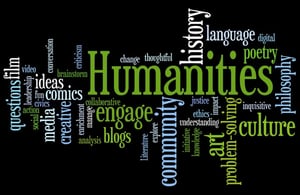 By Liz King and Raymond Pun
By Liz King and Raymond Pun
Raymond Pun recently spoke with Liz King, the Humanities Librarian at Alkek Library in Texas State University. Liz shares her techniques for connecting information literacy to things they do every day, how she overcomes misconceptions about the nature of research in the humanities field, and which resources she leans on when designing instruction.
Ray: Liz, thanks for speaking with us! Can you tell us about your role as an instruction librarian and how do you incorporate information literacy in your instruction and workshops?
Liz: I’m responsible for designing and delivering upper-level undergraduate and graduate information literacy instruction for my assigned subject areas (English, Philosophy, & Modern Languages). I work directly with teaching faculty to ensure that my lesson plans and learning outcomes dovetail with their subject-specific curriculum. I incorporate ACRL’s Framework for Information Literacy into my learning activities, and I use formative and summative assessments to measure the students’ level of comprehension. I also offer in-person or online individual & group research consultations to connect the students to the necessary resources “just-in-time,” as their deadlines approach and their research needs surface.
I’ve found an effective way to incorporate information literacy into instruction is to ask students how they utilize information literacy techniques in their daily activities. Once a student connects the concepts of information literacy to something they do every day, they can connect the same theories to navigating academic resources. A very brief (and usually lively) conversation about how filters apply to online dating apps (e.g. “I’m looking for someone who lives near my zip code, AND has a job AND likes dogs, AND has a car OR a bicycle.”) puts the students in the perfect mindset to discuss how being too specific during a database search might yield little to no results.
Ray: That’s a great point for students to think about concepts of information literacy based on every day experiences. What are some challenges you face when supporting information literacy for the humanities?
Liz: People often don’t realize that there is extensive research to be done in the humanities. When someone is studying English or Philosophy, outside of locating classic texts or reading literature reviews, there isn’t a sense of what humanities research entails. I’m currently working with a faculty member in our English Department to develop an information literacy lesson plan for his creative writing seminar students to conduct research on the themes found in their fiction. We met for an initial consultation where he described the assignments, and some sample topics from previous semesters.
After exploring some of our databases, including Credo Online Reference Service, HathiTrust, Defining Gender, Discovering American Women’s History Online, and our historical newspaper collections, we were able to compile resources for a lesson plan (which I’m developing for this semester) including original advertisements, images, diaries, and newspaper articles that will provide historical context to the students’ fictional accounts of vampires, cryptozoology, and historical figures.
In addition to those preconceptions, another challenge is the increasingly-present issue of “emotional labor” that many instruction librarians encounter; the time spent forming and fostering partnerships with teaching faculty is difficult to quantify, and thus isn’t always seen as “work.” I’ve encountered many colleagues who try to fit these outreach efforts in-between more quantifiable job duties such as instruction sessions, reference hours, and collection development. (And I haven’t even mentioned committees and task forces!)
Ray: You make a great point about primary sources and the humanities’ focus in these materials. Do you recommend any resources for instruction librarians to consider when thinking about the fields in philosophy and religious studies?
Liz: My go-to resources for developing information literacy instruction that incorporates the ACRL Framework and diverse assessment techniques include the following: The New Instruction Librarian; Undergraduate Research & The Academic Librarian; Classroom Assessment Techniques for Librarians; Teaching Information Literacy Threshold Concepts; and Teaching Information Literacy Reframed. For designing information literacy lessons specific to Philosophy and Religious Studies, I recommend exploring the resources found on ACRL’s Instruction Section’s web site: Information Literacy in the Disciplines: Philosophy. And for viewing peer-reviewed examples of what other instruction librarians are creating, I recommend looking at the ACRL Instruction Section PRIMO: Site of the Month database (disclosure: I am a member of this committee). While the PRIMO database showcases online instructional materials, I have found that the information literacy instruction techniques are easily transferable to in-person instruction.
Another invaluable resource is other subject-specific instruction librarians. Though we teach using different databases, and about different topics, the underlying pedagogy is the same. In the same way that we ask students to call on prior knowledge when they are learning new research techniques and information literacy theories, we can learn from what our colleagues have done in other subject areas.
 Liz King is a Research, Instruction & Outreach Librarian at Texas State University. She works with the faculty and students in the English, Philosophy, and Modern Languages Departments. Liz designs and teaches Information Literacy classes to undergraduate and graduate students to ensure that they have the research skills and knowledge of information literacy necessary to be successful in their studies. Liz is also an Adjunct Assistant Professor at Austin Community College, where she teaches Technical & Business Communications in online, hybrid and classroom settings. Liz is passionate about information literacy instruction using concepts from Universal Design for Learning, and the ACRL Framework for Information Literacy. She is interested in technology-rich instruction, embedded assessment, reflective-teaching practices, digital learning objects, and is working towards becoming a practitioner-researcher in the field of academic information literacy instruction.
Liz King is a Research, Instruction & Outreach Librarian at Texas State University. She works with the faculty and students in the English, Philosophy, and Modern Languages Departments. Liz designs and teaches Information Literacy classes to undergraduate and graduate students to ensure that they have the research skills and knowledge of information literacy necessary to be successful in their studies. Liz is also an Adjunct Assistant Professor at Austin Community College, where she teaches Technical & Business Communications in online, hybrid and classroom settings. Liz is passionate about information literacy instruction using concepts from Universal Design for Learning, and the ACRL Framework for Information Literacy. She is interested in technology-rich instruction, embedded assessment, reflective-teaching practices, digital learning objects, and is working towards becoming a practitioner-researcher in the field of academic information literacy instruction.

/CTA%20Images/CORSfooter.jpg?width=600&name=CORSfooter.jpg)